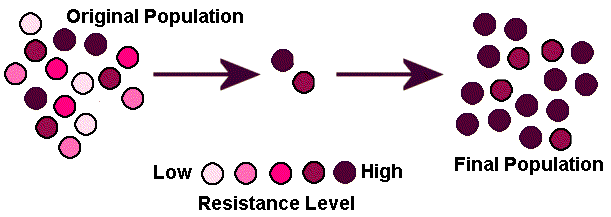How does natural selection act on individuals?
1 Answer
Natural selection is one of the processes that drives evolution by selecting individuals best adapted to the current environment.
Explanation:
Natural selection is based on three facts:
- There is natural variation within a population.
- There is differential production.
- These variations are heritable. (The heritable units are genes .)
Let's look at an example with fish. There are different genotypes and phenotypes present in our population of fish. Natural selection acts on those different phenotypes. Let's say some fish are large (one phenotype) and some are small (a second phenotype).
When the fish reach adulthood, they need to reproduce. The large fish are less likely to reproduce because they are more likely to be eaten by some predator. Small fish produce small fish and large fish produce large fish. Because those large fish are reproducing at a lower rate than the small fish, over time, the population changes. Eventually, the population is all small fish.
- The natural variation was the size of the fish.
- More small fish reproduced than large (because large fish experienced high mortality).
- The size of the fish depended on the size of the parents and was passed on.
Below is an example of a population where different individuals have different levels of resistance to a disease. Those individuals with greater resistance survive and reproduce, and the genetics of the population changes.

Individuals with higher fitness are more likely to succeed in natural selection. Fitness is the capability of an individual to survive and reproduce. Therefor, the fitness is both the survival chances and the reproductive ability (because you need to survive to have a chance to reproduce and pass on your genes). So, the individual with the highest fitness will be selected through natural selection.
For more information, check out the Understanding Evolution website .

